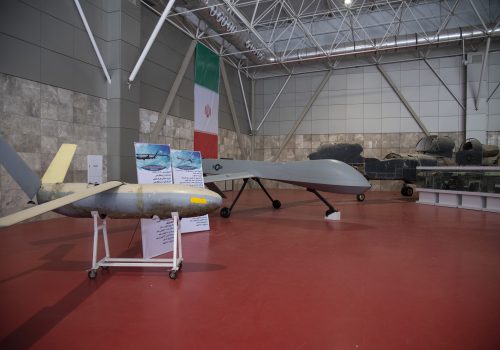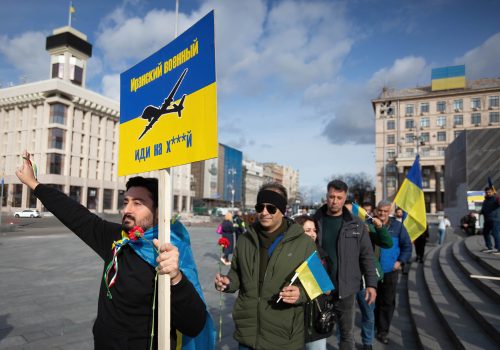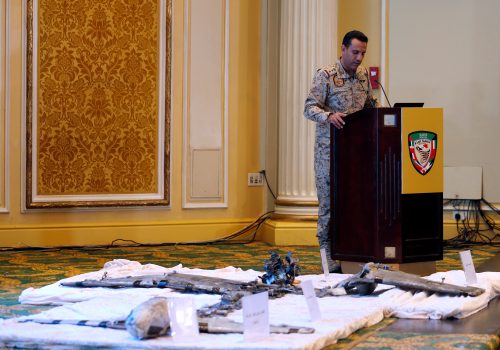Drone sales to Russia spark a debate in Iran
The revelation that Iran has sold drones to Russia that the latter is now using to attack Ukraine has touched off a debate about whether this growing closeness to Russia is in Iran’s national interest.
According to Realism, at a time of increasing polarization in the international system, small or medium-sized powers generally try to make coalitions with big powers in order to balance against rivals (external balancing), keep a safe distance from great powers, and avoid entering their conflicts. Based on this, Iranian reformists and even some conservatives have criticized the issue of delivering drones to Russia as undermining Iranian interests.
The drone sales have led to additional sanctions against Iran by the United States, Switzerland, and the European Union. They have also led some to accuse Iran of violating United Nations (UN) Security Council resolution 2231, which maintains restrictions on the export of Iranian missiles until 2023.
Contrary to what Iran says (that it gave the drones to Moscow before the conflict with Ukraine began on February 24), the Joe Biden administration released satellite images that showed Russian officials visited Kashan airport on June 8 and July 5 to inspect Iranian drones they were considering buying. According to US intelligence officials, the United States believed that Iran delivered the Mohajer-6 and Shahid drones to Russia in August.
On November 5, international pressure led Iranian Foreign Minister Amir-Abdollahian to confirm that Iran had provided drones to Russia. However, he insisted that the deliveries occurred before Russia’s February 24 invasion of Ukraine. These statements led Masih Mohajeri, the editor-in-chief of Jomhouri-e-Islami newspaper, to reply: “The fact that you have changed your position from denying the delivery of drones to Russia to admitting that we provided drones to Russia before the Ukraine war should be taken as a good omen. With this direction, if you accept the facts about other issues, many issues will change.”
Hossein Alaei, the former commander of the Islamic Revolutionary Guard Corps Navy, added: “There is a view that Russia sought to drag Iran into that war from the beginning of the attack on Ukraine, so that it would not be alone and the pressure of sanctions would increase on Iran. Russia wants to be relieved from the solution of Iran’s nuclear issue, hold Iran’s foreign policy hostage, and be able to restrain Iran’s independent behavior in some way. Perhaps this is the reason why Russia disclosed and publicized the matter of buying drones from Iran.”
Heshmatullah Falahat Pisheh, a conservative political activist and former head of the National Security and Foreign Policy Commission of parliament, wrote that Russia had benefited by hampering an Iranian return to the 2015 nuclear deal and was benefiting again from Iran’s isolation over Ukraine.
Some Iranian experts, including Nematullah Izadi, a former Iranian ambassador to Russia (1990-1994), suggested that Amir-Abdollahian had been kept in the dark about the drone sales and pointed to a lack of coordination between the “battlefield” and diplomacy.
The influence of military institutions on Iran’s foreign policy has been criticized by reformists and even moderate conservatives in the past. Mohammad Javad Zarif, the former foreign minister, had stated in a leaked audio tape from 2021 that the main decision maker in Iranian foreign policy is the “battlefield,” referring to the Islamic Revolutionary Guard Corps (IRGC), and not the Foreign Ministry.
Supreme Leader Ayatollah Ali Khamenei reacted strongly to Zarif’s words, saying they were making Iran’s enemies happy, and that the Foreign Ministry is supposed to be the executor, not the originator, of Iranian policies decided by higher institutions.
Based on this, Iran’s sale of drones to Russia has been criticized by both reformists and some moderate conservatives. Some Iranians even compare cooperation with Russia as a second Treaty of Turkmenchay, when Persia ceded territories to Russia in 1828.
Consequences of drones
Nevertheless, Iran’s sales of drones to Russia could bring severe prestige, political, and economic consequences.
Among them is the issue of the Ukraine war being tied to the fate of the Joint Comprehensive Plan of Action (JCPOA). In the past, Russia has played a constructive role in nuclear talks. But last March, when reaching a deal seemed likely, Moscow put the revival of the agreement in a coma by announcing that Iran’s trade with Russia should be exempt from sanctions. The deal is only supposed to provide Iran with sanctions relief tied to rolling back its nuclear program.
In fact, any issue that causes a relative improvement in relations between Iran and the West is considered a threat from Russia’s point of view.
In this regard, Rajab Safarov, a former member of the Russian Federation Presidential Political Council and head of the Iran Commission at the Moscow Chamber of Commerce and Industry, said recently that a Western-oriented Iran is more dangerous for Russia than a nuclear Iran. “Iran is like an iron defense shield for us (Russia) against the West and, if a pro-Western government comes to power in Iran, the collapse of Russia will begin from that moment,” he said.
Iran’s closer relationship with Russia can be analyzed from the perspective of Iran’s “deep state”—made up of security, intelligence, and economic organizations and institutions whose goal is to preserve the Islamic revolution ideology—interpretation of the international order and power competition on the domestic level. On this basis, Iran has emphasized a “Look to the East” foreign policy. In the transformation document of the current Ebrahim Raisi government, North America (US and Canada) has been clearly excluded as a potential region for establishing normal diplomatic relations.
Looking East
The emphasis of the “Look to the East” policy is also due to how Iran views the future of the international system.
Iran believes that the West has had an existential problem with the Islamic Republic since Iran’s 1979 revolution. Based on this, the West is not only not a partner for Iran, but an enemy that is trying to hurt Iran in different ways. Western sanctions dating to the beginning of the Islamic Revolution—when Iran was holding American diplomats hostage for 444 days—and the bringing of Iran’s nuclear issue to the UN Security Council on March 8, 2006, are seen in this light.
Iran’s interpretation of the future of the international system has caused Iran to abandon the foreign policy of “Neither East, Nor West” espoused by the leader of the revolution, Ayatollah Ruhollah Khomeini. This was based on a policy of non-alignment with world powers.
In his recent speeches, Ayatollah Khamenei has repeatedly spoken about a change in the international system and the need to construct Iran’s foreign policy according to new conditions. He argues that the United States is a declining power while Russia and China are the future poles of the international system, and that Iran must have an alliance with the latter pair. He also argues that “neither East” in the slogan “Neither East, nor West” does not mean not having a relationship and alliance with Asian powers.
China and Russia, which, in the past, voted against Iran in the UN Security Council on nuclear-related sanctions, have lately voted in support of Iran and opposed the West.
“Look to the East” is also caused by competition in Iran’s internal power structure. In this regard, it should be noted that foreign policy and domestic policy are connected. Conservative groups support the “Look to the East” policy, as its continuation and intensification weaken Western-oriented factions that advocate for a more balanced foreign policy.
Foreign policy in Iran is mainly defined by the so-called “deep state” while the policies of specific administrations are a kind of “small game” compared to this “big game” of policy. The more balanced policies of Presidents Ali Akbar Hashemi Rafsanjani (1989-1997), Mohammad Khatami (1997-2005), and Hassan Rouhani (2013-2021) were tolerated by the deep state to the extent that they did not disturb the “big game.”
To serve Iran, foreign policy should reflect the interests of ordinary people and not just specific groups. Accordingly, putting every egg in Russia’s basket reduces Iran’s maneuverability and makes Iranians pay for Moscow’s adventures.
Javad Heiran-Nia is director of the Persian Gulf Studies Group at the Center for Scientific Research and Middle East Strategic Studies in Iran. Follow him on Twitter: @J_Heirannia.
Further reading
Thu, Nov 18, 2021
Iran’s drones are clones. Now they’re being used in multiple conflicts.
IranSource By
Iran’s military drone program has grown in recent years and Iran-backed groups have increasingly used drones in conflicts.
Fri, Nov 18, 2022
Iran’s export of drones to Russia will lead to more proliferation and threaten US partners
IranSource By
Russia’s increasing use of Iranian drones in the war in Ukraine has spotlighted the danger that Iran’s drones pose globally and regionally.
Thu, Oct 28, 2021
Iran’s drones are a buzzing menace for Saudi Arabia
MENASource By
The small but sophisticated Iranian-made armed drones have undercut the security balance in the Gulf region and the Arabian Peninsula over the past few years, ushering in a novel asymmetrical menace.
Image: A view of a drone during a military exercise in an undisclosed location in Iran, in this handout image obtained on August 24, 2022. Iranian Army/WANA (West Asia News Agency)/Handout via REUTERS


